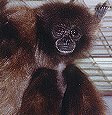 Meet Penny, one of IPPL's
Sanctuary Gibbons
Meet Penny, one of IPPL's
Sanctuary Gibbons
THERE'S A MONKEY IN MY CLASSROOM
CERCOPAN brings conservation into Nigerian schools
by Lynne R. Baker
Imagine a group of African school children sitting together in a circle on a dirt floor. The mud-and-clay room is lit only by bits of sunlight peeking through the zinc sheeting that serves as a roof. Between giggles and squeals, one can hear the roll of dice. Clearly, they are playing a game, but this is no ordinary game.
Like most games, its players can be penalized or rewarded depending on their luck. But unlike other games, players are not trying to buy hotels on Boardwalk or avoid chutes and climb ladders. They are instead trying to stop poachers, save monkeys and protect Africa's rainforest.
The object of such enthusiasm? The CERCOPAN Conservation Game, a board game designed for Nigerian children to help them learn about preserving primates and forests.
The game was developed by CERCOPAN in early 1997 to coincide with the kickoff of the organization's first education outreach program for secondary schools. The project also the hired its first education officer, Jerry Akparawa, a Nigerian, at same time. The outreach program took place from May to July 1997, when Akparawa visited 21 schools in the Calabar Local Government Area in Cross River State.
Thanks to the Sacramento Zoo in California and the International Primate Protection League-U.K., enough funds were available to pay Akparawa's salary and produce various educational materials, such as the conservation board game.
Similar to "Chutes & Ladders" (also known as "Snakes and Ladders"), this unique board game was designed by a talented local Nigerian artist. It displays images of most of CERCOPAN's primate species and conveys important messages on the major stopping positions, such as "Hunter just killed an endangered red-eared monkey. Go back 3 spaces." "A mona monkey is born in the wild. Take another turn." "Habitat where forest monkeys live is turned into a protected nature reserve. Move forward 4 spaces."
In addition to the board game, the outreach program consisted of a slide presentation that showed images of monkeys - which many of the school children had no idea existed or that such animals lived so close to them - and a "Who Am I?" game, which required children to use their knowledge of nature to win.
Overall, the program was a success, overcoming such challenges as a lack of decent transportation and the occasional uncooperative school administration; and annoying power outages, which often put the slide projector out of operation.
After the program, CERCOPAN hoped to find the money and time to develop more board games. At about 3' x 4', the original board was placed on an easel during presentations, and teams of students were established. The game was most effective with about six to 10 teams at one time, but often school administrations would usher in 50 to 200 children.
Such large numbers of students sometimes limited how well children could see or participate in the CERCOPAN game. Still, many children stayed after their presentation to get a better look at the board, and requests from several schools for their own copies of the game rolled in.
Good news arrived in December 1997, when CERCOPAN received a grant from the Netherlands Embassy in Lagos, Nigeria, to fund the development and production of 1,000 CERCOPAN Conservation Games and 2,500 posters. The new game boards will be closer in size to standard board games, such as Monopoly, and will be updated in design to represent all of CERCOPAN's primate species.
"Initial recipients of the board games will be schools, particularly those with conservation clubs, in the Calabar region and other, more rural schools," said Zena Tooze, director of CERCOPAN. "We hope that by targeting children through our education program and game distribution, we can help build a foundation for conservation awareness and action in Nigeria."
School children are not the only ones benefiting from CERCOPAN's education efforts. Any youngster who visits the project can try his or her luck at "Primate Play," an activity sheet designed by current CERCOPAN volunteer Deborah Goin. The sheet, which changes monthly, includes a crossword puzzle and other learning activities. A new raffia-covered education area in the CERCOPAN compound displays some of the completed sheets, as well as other important conservation information.
"We hope that by targeting children through our education program and
game distribution, we can help build a foundation for conservation awareness
and action in Nigeria," ZENA TOOZE
 Meet Penny, one of IPPL's
Sanctuary Gibbons
Meet Penny, one of IPPL's
Sanctuary Gibbons